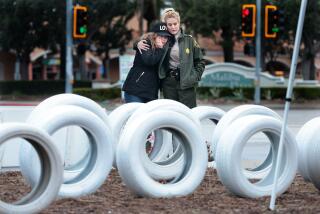Bills Seek to Improve Farm Labor Van Safety
SACRAMENTO — In the aftermath of Monday’s crash that killed 13 migrant workers in the San Joaquin Valley, emergency legislative reforms were proposed Tuesday that include a bill to require safety belts on farm labor vans.
“These accidents are almost as predictable as the harvests in the valley. We are tired of these accidents,” said a shaken Assemblyman Dean Florez, a Democrat from the valley city of Shafter.
He and Assemblywoman Sarah Reyes (D-Fresno) proposed a package of emergency bills to crack down on what they characterized as a worker transport system desperately in need of tighter regulation.
“We have a major tragedy here in the valley,” Reyes said.
The two Latino freshmen legislators scrambled to draft the bills one day after the tomato pickers were killed when the long van they were riding in smashed into a tractor-trailer on a country road near Five Points in Fresno County.
Two other occupants of the van were badly injured in the predawn collision, one of the worst in a farm region where such crashes have become tragically common. The truck driver was not injured.
Except for the driver’s and front passenger’s seats, the van, whose permit to carry passengers had expired last year, was not equipped with seat belts. The passengers sat on carpeted wood benches without safety restraints.
Florez and Reyes announced their proposed legislative package at their district offices in the San Joaquin Valley.
The measures, which would have to be acted upon during the Legislature’s final weeks before its scheduled adjournment Sept. 10, would:
* Require any vehicle that transports farm workers to and from the job to be equipped with seat belts. Currently, vans that carry 10 or more people are classified as buses and are exempt from seat belt requirements, as are school and commercial buses.
* Spend $4.5 million to expand from six to about 55 the number of special California Highway Patrol officers charged with enforcing laws against illegal transportation of agricultural workers. The team’s vast jurisdiction ranges from Bakersfield to Sacramento.
* Prohibit replacing the manufacturer’s seats in vans with benches that can seat more workers. Reyes said the van crushed in the Five Points crash had been “hollowed out” to accommodate the benches.
* Create a mandatory system for safety certification of such vehicles by the CHP. Currently, van operators are not compelled by law to have their vehicles inspected.
Although time is running short for action this session, Florez predicted that the Legislature would enact the reforms swiftly. He said he believes that the package will be supported by growers, labor, consumer advocates and others, but suggested that Gov. Gray Davis might resist spending the extra $4.5 million for the beefed-up CHP team.
“We really have to get the governor focused on the additional lives it will save. I think we will see that the death toll will move down,” Florez said.
Davis agreed Tuesday that such accidents are “happening too often during the harvest season.” He did not express an opinion on the proposed bills but told reporters that there “may be reasonable measures we can take to enhance the security of people who work on farms.”
Mandatory seat belts for farm worker transportation vehicles drew immediate endorsement from the powerful California Farm Bureau Federation.
“Anything that we can do to make the transportation of farm workers safe is OK with us,” said Cindy Cory, a lobbyist for the group. But she cautioned that seat belts alone will not resolve complex legal issues, such as whether growers should be held at least partly liable for traffic accidents involving workers.
“It is not just a simple thing that we can make this all happy if we put seat belts in,” she said.
Mark Schacht, deputy director of the California Rural Legal Assistance Foundation, which lobbies on behalf of farm workers, called the seat belt proposal long overdue.
“If the governor of the state of California wants this bill, it would happen,” he said.
Under state law, passenger vehicles that can carry up to 10 people must be equipped with safety belts. And it is against the law to not wear the restraints.
Vehicles that can accommodate more riders are exempt.
To get CHP certification as a bus, farm labor vans must meet certain safety requirements, including affixing the wooden benches to the van itself.
Historically, the issue of requiring seat belts for farm worker transportation vehicles has escaped legislative scrutiny, veteran transportation safety experts said Tuesday.
John F. Foran, a former chairman of both the state Senate and Assembly transportation committees, said he could recall no efforts by growers to exempt farm vehicles from seat belt requirements.
“The attention was always on passenger cars,” he said. Officials of the CHP and Department of Motor Vehicles said they recalled no lobbying to exempt farm vehicles.
*
Times staff writer Jenifer Warren contributed to this story.
More to Read
Sign up for Essential California
The most important California stories and recommendations in your inbox every morning.
You may occasionally receive promotional content from the Los Angeles Times.










